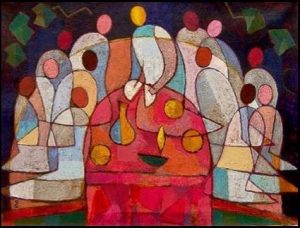 When the English historian Christopher Dawson decided to become a Roman Catholic, his aristocratic mother was distraught, not because of Catholic teaching, but because now her son would, in her words, have to “worship with the help.” His background would no longer set him apart from others or above anyone. At church he would be just an equal among equals because the Eucharist would strip him of his higher social status. It was this very thing that first drew Dorothy Day to Christianity. During the Eucharist, she noticed the rich and the poor knelt side by side; all humbled before the great gift of Christ. Around the Eucharistic table what Mary prophesized in her Magnificat came to be, that, in Jesus, the mighty would be brought down and that lowly would be raised up.
When the English historian Christopher Dawson decided to become a Roman Catholic, his aristocratic mother was distraught, not because of Catholic teaching, but because now her son would, in her words, have to “worship with the help.” His background would no longer set him apart from others or above anyone. At church he would be just an equal among equals because the Eucharist would strip him of his higher social status. It was this very thing that first drew Dorothy Day to Christianity. During the Eucharist, she noticed the rich and the poor knelt side by side; all humbled before the great gift of Christ. Around the Eucharistic table what Mary prophesized in her Magnificat came to be, that, in Jesus, the mighty would be brought down and that lowly would be raised up.
Next week on the Solemnity of Corpus Christi we will celebrate many wondrous things about the gift of the most precious Body and Blood of Christ, but sadly, we often do not consider the nature of justice that attends to the Eucharist – the gift of God that levels the distinction between those born high and those low, between saint and sinner, or between the faithful and those whose faith is weakened. The challenge to reach out to the poor and to level the distinction between rich and poor is an integral and non-negotiable part of being a Christian, commanded as strongly as any of the commandments. And this challenge is contained in the Eucharist itself.
In the Eucharist, there is only one equal family praying together in a common humanity in which we all remember Jesus’ brokenness, his poverty, his body being broken, and his blood being poured out. Pierre Teilhard de Chardin expresses this aptly when he suggests that the wine offered at the Eucharist symbolizes precisely the brokenness of the poor: “In a sense the true substance to be consecrated each day is the world’s development during that day—the bread symbolizing appropriately what creation succeeds in producing, the wine (blood) what creation causes to be lost in exhaustion and suffering in the course of that effort. The Eucharist offers up the tears and blood of the poor and invites us to help alleviate the conditions that produce tears and blood.”
In our common humanity we are called to move beyond private devotional prayer, to a communal act of worship, which among other things, calls us to go forth and live out in the world what we celebrate inside of a church. A world where God gives special place to the tears and blood of the poor, and the non-negotiable challenge from God to each of us is to work at changing the conditions that cause tears and blood. The Eucharist calls us to love tenderly, but, just as strongly, it calls us to act in justice.
To say that Eucharist calls us to justice and to social justice is not a statement that takes its origin in political correctness. It takes its origin in Jesus who, drawing upon the great prophets of old, assures us that the validity of all worship will ultimately be judged by how it affects “widows, orphans, and strangers.”




